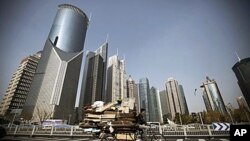Despite the global financial crisis, China's economy continued its rapid growth this year, surpassing Japan as the second-largest in the world behind the United States. Chinese leaders now aim to increase domestic consumption and domestic demand, helping to turn the China market into an important new growth engine for the rest of the world.
That reality was acknowledged by President Barack Obama in November at a regional economic forum in Japan, where he said American consumers no longer will be the main drivers of world growth.
"Going forward, countries with large surpluses must shift away from an unhealthy dependence on exports and take steps to boost domestic demand. As I said, going forward, no nation should assume that their path to prosperity is simply paved with exports to America," Mr. Obama said.
At the same gathering, Chinese President Hu Jintao indicated that China, with its 1.3 billion people, is preparing to soak up some of the world's production.
China will accelerate economic development reform and focus on expanding domestic demand, said Hu, especially consumer demand through increasing residents' income and purchases. Another emphasis will be accelerating rural development and regional growth, he said.
China dominated car sales, and in 2010 passed the United States to become the biggest market in the world. In 2009, more than 13.6 million cars were sold in China . At Beijing's largest dealership, Zhao Xuzhen and his family shop for their first car.
It is important that the new car be safe, because there are so many cars in Beijing, Zhao said. Also, because people are so interested in protecting the environment, he said, it also has to be fuel-efficient.
China's growing economic clout means more investment overseas along with more immigrants coming to China to try to make their fortunes. For example, Guangzhou, China's southern commercial center draws people from all over Africa and the rest of the world.
Chinese people see the country's economic rise as indisputable, says Cheng Li, at the Brookings Institution research organization in Washington.
"They see China's coming of age [has] finally arrived, because now China [is] not only the first country to recover from the global financial crisis, as a major economic power, [it has]already made the number two position in the world," Cheng said. "Now, China has money, which they believe is the most important thing. Money can talk."
While Chinese economists acknowledge the country's achievements, there is a sense that there still is a long way to go.
Hu Xingdou, an economist at the Beijing Institute of Technology, says Westerners paint too rosy a picture of China, where development is uneven. Some people willingly exaggerate China's strength and create a sense of danger from China because they do not understand the country, Hu says.
Furthermore, few people from overseas go to see the Chinese countryside or less developed western areas, says Hu, adding that many Chinese scholars think China's cities look like Europe, but the countryside looks like Africa.
That difference is seen in per capita incomes: the urban per capita income in China was almost $2,600 a year in 2009. For rural residents, the amount was just under $800.
While the government has worked for years to improve rural incomes and close the urban-rural gap, it has made only modest progress. And with inflation expected to remain high in the coming months, especially for food prices, the rural poor may be further squeezed.
China's per capita gross domestic product remains low, says Professor Hu. Therefore, he says, development is still the greatest task for Chinese leaders. But, he says, the country will also need political and social reforms if economic development is to succeed.
China's Economic Clout Grows in 2010




